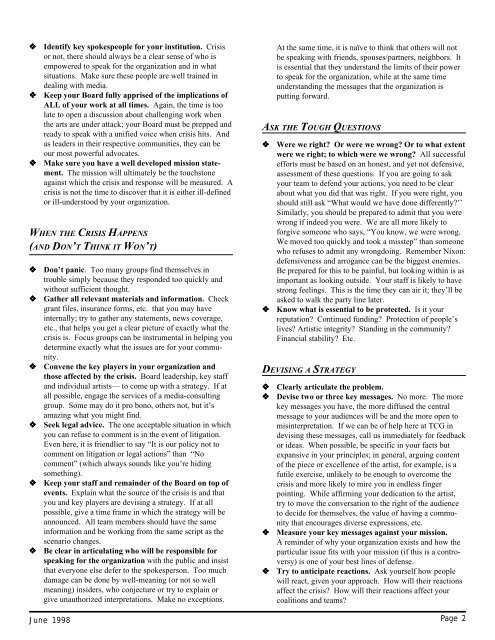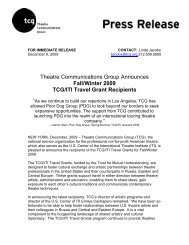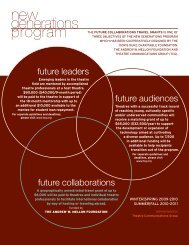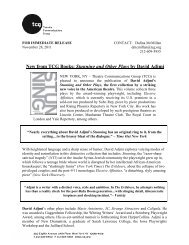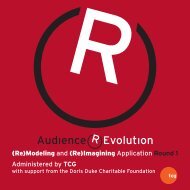Action Plan for Crisis (PDF) - Theatre Communications Group
Action Plan for Crisis (PDF) - Theatre Communications Group
Action Plan for Crisis (PDF) - Theatre Communications Group
- No tags were found...
You also want an ePaper? Increase the reach of your titles
YUMPU automatically turns print PDFs into web optimized ePapers that Google loves.
! Identify key spokespeople <strong>for</strong> your institution. <strong>Crisis</strong>or not, there should always be a clear sense of who isempowered to speak <strong>for</strong> the organization and in whatsituations. Make sure these people are well trained indealing with media.! Keep your Board fully apprised of the implications ofALL of your work at all times. Again, the time is toolate to open a discussion about challenging work whenthe arts are under attack; your Board must be prepped andready to speak with a unified voice when crisis hits. Andas leaders in their respective communities, they can beour most powerful advocates.! Make sure you have a well developed mission statement.The mission will ultimately be the touchstoneagainst which the crisis and response will be measured. Acrisis is not the time to discover that it is either ill-definedor ill-understood by your organization.WHEN THE CRISIS HAPPENS(AND DON’T THINK IT WON’T)! Don’t panic. Too many groups find themselves introuble simply because they responded too quickly andwithout sufficient thought.! Gather all relevant materials and in<strong>for</strong>mation. Checkgrant files, insurance <strong>for</strong>ms, etc. that you may haveinternally; try to gather any statements, news coverage,etc., that helps you get a clear picture of exactly what thecrisis is. Focus groups can be instrumental in helping youdetermine exactly what the issues are <strong>for</strong> your community.! Convene the key players in your organization andthose affected by the crisis. Board leadership, key staffand individual artists— to come up with a strategy. If atall possible, engage the services of a media-consultinggroup. Some may do it pro bono, others not, but it’samazing what you might find.! Seek legal advice. The one acceptable situation in whichyou can refuse to comment is in the event of litigation.Even here, it is friendlier to say “It is our policy not tocomment on litigation or legal actions” than “Nocomment” (which always sounds like you’re hidingsomething).! Keep your staff and remainder of the Board on top ofevents. Explain what the source of the crisis is and thatyou and key players are devising a strategy. If at allpossible, give a time frame in which the strategy will beannounced. All team members should have the samein<strong>for</strong>mation and be working from the same script as thescenario changes.! Be clear in articulating who will be responsible <strong>for</strong>speaking <strong>for</strong> the organization with the public and insistthat everyone else defer to the spokesperson. Too muchdamage can be done by well-meaning (or not so wellmeaning) insiders, who conjecture or try to explain orgive unauthorized interpretations. Make no exceptions.At the same time, it is naïve to think that others will notbe speaking with friends, spouses/partners, neighbors. Itis essential that they understand the limits of their powerto speak <strong>for</strong> the organization, while at the same timeunderstanding the messages that the organization isputting <strong>for</strong>ward.ASK THE TOUGH QUESTIONS! Were we right? Or were we wrong? Or to what extentwere we right; to which were we wrong? All successfulef<strong>for</strong>ts must be based on an honest, and yet not defensive,assessment of these questions. If you are going to askyour team to defend your actions, you need to be clearabout what you did that was right. If you were right, youshould still ask “What would we have done differently?’’Similarly, you should be prepared to admit that you werewrong if indeed you were. We are all more likely to<strong>for</strong>give someone who says, “You know, we were wrong.We moved too quickly and took a misstep” than someonewho refuses to admit any wrongdoing. Remember Nixon:defensiveness and arrogance can be the biggest enemies.Be prepared <strong>for</strong> this to be painful, but looking within is asimportant as looking outside. Your staff is likely to havestrong feelings. This is the time they can air it; they’ll beasked to walk the party line later.! Know what is essential to be protected. Is it yourreputation? Continued funding? Protection of people’slives? Artistic integrity? Standing in the community?Financial stability? Etc.DEVISING A STRATEGY! Clearly articulate the problem.! Devise two or three key messages. No more. The morekey messages you have, the more diffused the centralmessage to your audiences will be and the more open tomisinterpretation. If we can be of help here at TCG indevising these messages, call us immediately <strong>for</strong> feedbackor ideas. When possible, be specific in your facts butexpansive in your principles; in general, arguing contentof the piece or excellence of the artist, <strong>for</strong> example, is afutile exercise, unlikely to be enough to overcome thecrisis and more likely to mire you in endless fingerpointing. While affirming your dedication to the artist,try to move the conversation to the right of the audienceto decide <strong>for</strong> themselves, the value of having a communitythat encourages diverse expressions, etc.! Measure your key messages against your mission.A reminder of why your organization exists and how theparticular issue fits with your mission (if this is a controversy)is one of your best lines of defense.! Try to anticipate reactions. Ask yourself how peoplewill react, given your approach. How will their reactionsaffect the crisis? How will their reactions affect yourcoalitions and teams?June 1998 Page 2


